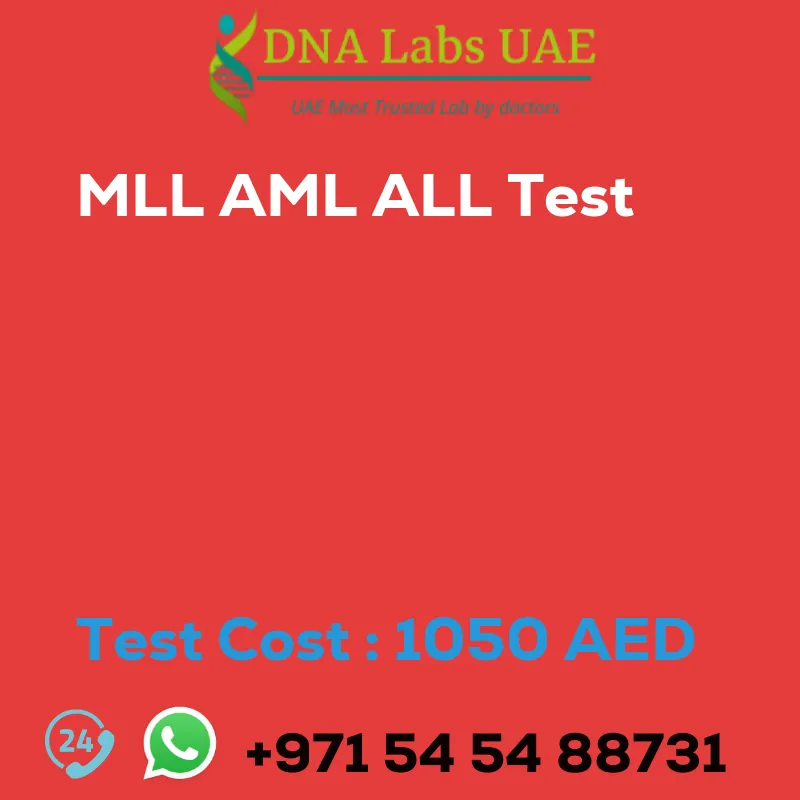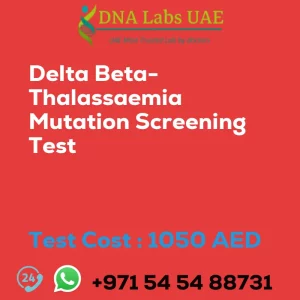MLL AML ALL Test Cost AED:1050.0 Symptoms Diagnosis
Are you looking for information about the MLL AML ALL Test cost and symptoms? Look no further! DNA Labs UAE offers comprehensive genetic testing services, including the MLL AML ALL Test.
Test Details
The MLL AML ALL Test is a genetic test that helps diagnose and categorize leukemia. MLL, also known as mixed-lineage leukemia, is a type of leukemia that affects both children and adults. It is characterized by a genetic abnormality in the MLL gene, which plays a role in regulating the growth and development of blood cells.
MLL can be further categorized into acute myeloid leukemia (AML) and acute lymphoblastic leukemia (ALL), depending on the specific type of blood cells affected. AML is a cancer of the myeloid cells, which are responsible for producing red blood cells, white blood cells, and platelets. ALL, on the other hand, affects the lymphoid cells, which are responsible for producing lymphocytes, a type of white blood cell.
Both AML and ALL can cause symptoms such as fatigue, frequent infections, easy bruising or bleeding, and enlarged lymph nodes. If you are experiencing any of these symptoms, it is important to consult with a doctor for further evaluation.
Test Components
- Sodium Heparin Vacutainer (2ml)
Test Price
The cost of the MLL AML ALL Test at DNA Labs UAE is 1050.0 AED.
Sample Condition
The MLL AML ALL Test requires a bone marrow or peripheral blood sample.
Report Delivery
You can expect to receive your test report within 3-4 days after the sample is received at DNA Labs UAE.
Method
The MLL AML ALL Test is performed using the FISH method, which stands for fluorescence in situ hybridization. This method helps identify genetic abnormalities in the MLL gene.
Test Type
The MLL AML ALL Test falls under the category of genetics testing.
Doctor
The MLL AML ALL Test is typically ordered by oncologists, who specialize in the diagnosis and treatment of cancer.
Test Department
The MLL AML ALL Test is conducted in the genetics testing department at DNA Labs UAE.
Pre Test Information
The MLL AML ALL Test requires a doctor’s prescription. However, please note that the prescription is not applicable for surgery and pregnancy cases or individuals planning to travel abroad.
Treatment
Treatment for MLL typically involves chemotherapy, radiation therapy, and sometimes stem cell transplantation. The specific treatment approach may vary depending on the age of the patient, the subtype of MLL, and other individual factors. It is important to consult with an oncologist to determine the best treatment plan for your specific case.
Overall, the MLL AML ALL Test is a valuable tool for diagnosing and categorizing leukemia. If you suspect you may have MLL or are experiencing symptoms associated with AML or ALL, it is important to seek medical attention for proper evaluation and treatment.
| Test Name | MLL AML ALL Test |
|---|---|
| Components | Sodium Heparin Vacutainer (2ml) |
| Price | 1050.0 AED |
| Sample Condition | Bone Marrow \/ Peripheral blood |
| Report Delivery | 3-4 days |
| Method | FISH |
| Test type | Genetics |
| Doctor | Oncology |
| Test Department: | |
| Pre Test Information | MLL (AML, ALL) can be done with a Doctors prescription. Prescription is not applicable for surgery and pregnancy cases or people planing to travel abroad. |
| Test Details |
MLL, also known as mixed-lineage leukemia, is a type of leukemia that affects both children and adults. It is characterized by a genetic abnormality in the MLL gene, which plays a role in regulating the growth and development of blood cells. MLL can be further categorized into acute myeloid leukemia (AML) and acute lymphoblastic leukemia (ALL), depending on the specific type of blood cells affected. AML is a cancer of the myeloid cells, which are responsible for producing red blood cells, white blood cells, and platelets. In AML, the abnormal MLL gene causes the myeloid cells to grow and divide uncontrollably, leading to the accumulation of immature cells in the bone marrow and blood. ALL, on the other hand, affects the lymphoid cells, which are responsible for producing lymphocytes, a type of white blood cell. In ALL, the abnormal MLL gene disrupts the normal development of lymphoid cells, causing them to multiply rapidly and crowd out healthy cells in the bone marrow and blood. Both AML and ALL can cause symptoms such as fatigue, frequent infections, easy bruising or bleeding, and enlarged lymph nodes. Treatment for MLL typically involves chemotherapy, radiation therapy, and sometimes stem cell transplantation. The specific treatment approach may vary depending on the age of the patient, the subtype of MLL, and other individual factors. |








